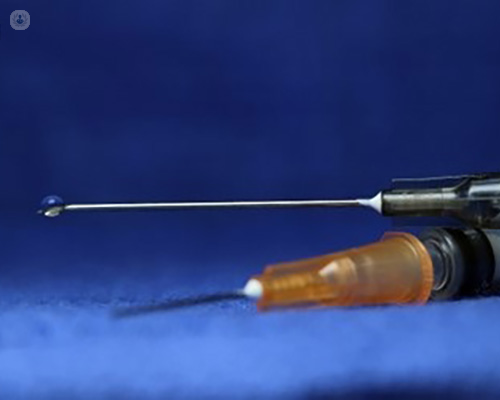Bulkamid® injections: treating urinary incontinence in women
Written by:There’s a myriad of treatments available on the market for women suffering from urinary incontinence. Granted, not all are a treatment of choice for many due to the potential side-effects they can carry.
Recently, however, a new treatment known as Bulkamid has caught everyone’s attention; with its excellent safety profile and minimally invasive nature, this small injection is soon becoming the number one treatment for SUI across Europe.
Mr Aza Mohammed is a leading consultant urological surgeon with over 20 years of experience dealing with female urinary incontinence and other urological pathologies. We sat down with him while he explained exactly what Bulkamid is and how this convenient treatment is significantly improving the day-to-day lives of many women.

What is Bulkamid?
Bulkamid is a treatment for urinary incontinence in women. It is a type of bulking agent that consists of a smooth hydrogel made from 97.5% water and 2.5% polyacrylamide. This treatment is injected into the urethral wall using a small telescope, and once injected, it can provide additional volume to the urethra and act as a scaffold for cells to grow, providing long-lasting relief.
How does it help women with urinary incontinence?
Bulkamid aims to restore the natural closing pressure of the urethra preventing urine from leaking out unintentionally during normal daily activities such as coughing, laughing, walking or exercising.
What are the advantages of this procedure?
In comparison to other alternative treatments, such as a mesh tape or colposuspension, Bulkamid is less invasive, much faster to perform and it doesn’t require any incisions. The full procedure takes roughly 5-10 minutes and recovery time is very short. You can typically return to your normal activities the following day.
How many injections are needed and what is the procedure like?
A number of small injections - typically three to four – are needed to administer the treatment. If it’s done under local anaesthetic, you may feel a sting, however, the procedure can be performed under general anaesthetic if you would like it to be. You can also opt to have a top-up three months later to enhance the overall results.
Are there any side-effects?
So far, there have been no long-term complications reported from more than 70,000 women that have been treated. Short term side effects, however, may include mild pain after the procedure, difficulty emptying your bladder, bladder urgency and urinary tract infection. There have been reports of women experiencing mild burning or bleeding when urinating, however, these normally resolve after a couple of days.
How effective is this treatment?
Following the procedure, 3 out of 4 four women report their symptoms were either cured or had improved significantly. Overall, the treatment is very successful and effective at treating urinary incontinence in women.
If you are interested in this treatment and want to learn more, visit Mr Aza Mohammed’s Top Doctors profile and book a consultation with him.


